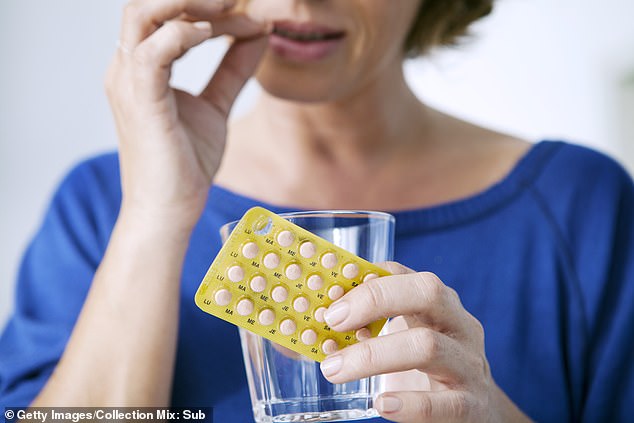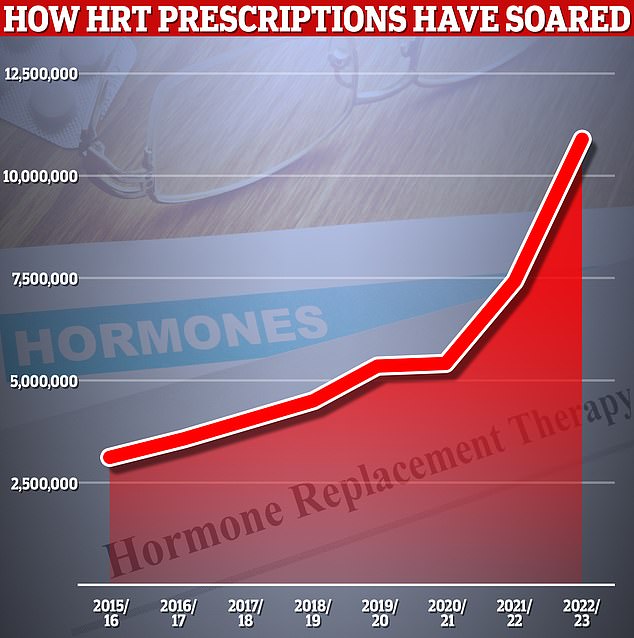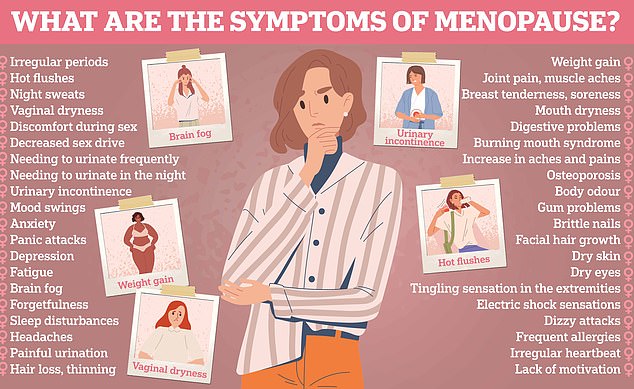Women who use HRT to get through menopause are almost 50% more likely to develop arthritis, study shows
- Researchers followed more than 200,000 Britons for an average of twelve years
- They found that women taking HRT were associated with a 46% higher risk of conditions
<!–
<!–
<!– <!–
<!–
<!–
<!–
Women who use hormone replacement therapy (HRT) are almost half as likely to develop arthritis than those who don’t, a study suggests.
Starting menopause early and having four or more children were also linked to a greater likelihood of developing rheumatoid arthritis risk, researchers found.
Experts say the increased risk of the autoimmune disease is likely due to lower levels of naturally occurring hormones estrogen and progesterone during menopause, which are known to have anti-inflammatory effects.
They suggest the ‘significant’ findings should be used to look at targeted treatment for the women most at risk.

Experts say the increased risk of the autoimmune disease is likely due to lower levels of naturally occurring hormones estrogen and progesterone during menopause, which are known to have anti-inflammatory effects.


Experts suggest the ‘significant’ findings should be used to look at targeted treatment for the women most at risk. Official figures show that prescriptions for hormone replacement therapy (HRT) have increased by 47 percent compared to 2021/2022


NHS data shows that around 400,000 people in Britain have rheumatoid arthritis, with around three times as many women affected as men.
It typically causes joint pain and inflammation in areas such as the hands, knees and ankles, due to a person’s immune system attacking their own body cells.
Although hormonal and reproductive factors are thought to contribute to women’s increased sensitivity, researchers wanted to test which factors might be particularly influential.
They studied data from 223,526 UK Biobank participants whose health was monitored for an average of 12 years.
During the period, 3,313 women developed rheumatoid arthritis, according to the findings published in the journal RMD Open.
They found that going through menopause before age 45 carries a 46 percent increased risk compared to those at ages 50-51.
Taking HRT, which helps relieve menopausal symptoms, was associated with a 46 percent higher risk, researchers said.
Those with fewer than 33 reproductive years – the time between onset and menopause – had a 39 percent higher risk, while onset periods after age 14 were associated with a 17 percent higher risk than at age 13.
Women with four or more children had an 18 percent higher risk than women with two children, they said, again likely due to differences in hormone levels.
GP and menopause specialist Dr Louise Newson said the findings should not cause too much concern for women taking HRT as ‘body-identical hormones’ such as patches, gel or spray are becoming increasingly common these days.
She said it was likely that the findings related to women who were prescribed older, synthetic forms of HRT, rather than the more natural types of hormones now prescribed.
She said: ‘We have known for decades that our natural sex hormones estradiol – the main type of estrogen – and progesterone, which decline during menopause, are anti-inflammatory.
‘Women who enter menopause earlier, that is before the age of 45, are without these natural hormones for longer and are therefore at greater risk of inflammation and autoimmune diseases, including rheumatoid arthritis.’
She added: ‘Older estrogen tablets can be converted to estrone, an inflammatory type of estrogen, while older synthetic progestins do not have the same anti-inflammatory effects as body-identical progesterone.’
